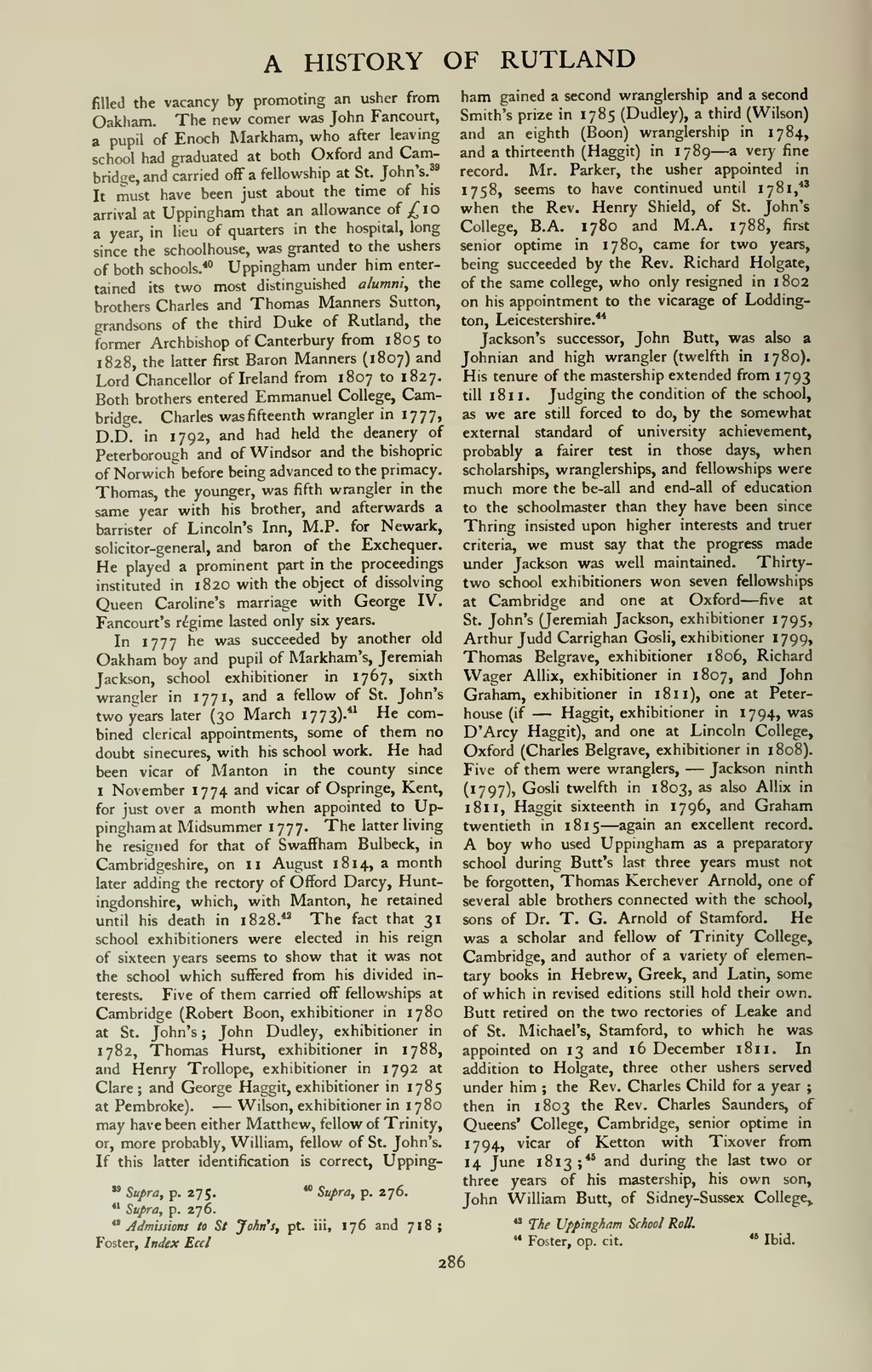A HISTORY OF RUTLAND filled the vacancy by promoting an usher from Oakham. The new comer was John Fancourt, a pupil of Enoch Markham, who after leaving school had graduated at both Oxford and Cam- brid<ie,and carried off a fellowship at St. John's.'^ It must have been just about the time of his arrival at Uppingham that an allowance of ^{^lO a year, in lieu of quarters in the hospital, long since the schoolhouse, was granted to the ushers of both schools.*" Uppingham under him enter- tained its two most distinguished alumni, the brothers Charles and Thomas Manners Sutton, grandsons of the third Duke of Rutland, the former Archbishop of Canterbury from 1805 to 1828, the latter first Baron Manners (1807) and Lord Chancellor of Ireland from 1 807 to 1827. Both brothers entered Emmanuel College, Cam- bridge. Charles was fifteenth wrangler in 1777, D.D. in 1792, and had held the deanery of Peterborough and of Windsor and the bishopric of Norwich before being advanced to the primacy. Thomas, the younger, was fifth wrangler in the same year with his brother, and afterwards a barrister of Lincoln's Inn, M.P. for Newark, solicitor-general, and baron of the Exchequer. He played a prominent part in the proceedings instituted in 1820 with the object of dissolving Queen Caroline's marriage with George IV. Fancourt's rd-gime lasted only six years. In 1777 he was succeeded by another old Oakham boy and pupil of Markham's, Jeremiah Jackson, school exhibitioner in 1767, sixth wrangler in 1 771, and a fellow of St. John's two years later (30 March 1773)." He com- bined clerical appointments, some of them no doubt sinecures, with his school work. He had been vicar of Manton in the county since I November 1774 and vicar of Ospringe, Kent, for just over a month when appointed to Up- pingham at Midsummer 1777. The latter living he resigned for that of SwafFham Bulbeck, in Cambridgeshire, on 1 1 August 1 8 14, a month later adding the rectory of OfFord Darcy, Hunt- ingdonshire, which, with Manton, he retained until his death in 1828." The fact that 31 school exhibitioners were elected in his reign of sixteen years seems to show that it was not the school which suffered from his divided in- terests. Five of them carried off fellowships at Cambridge (Robert Boon, exhibitioner in 1780 at St. John's ; John Dudley, exhibitioner in 1782, Thomas Hurst, exhibitioner in 1788, and Henry Trollope, exhibitioner in 1792 at Clare; and George Haggit, exhibitioner in 1785 at Pembroke). — Wilson, exhibitioner in 1780 may have been either Matthew, fellow of Trinity, or, more probably, William, fellow of St. John's. If this latter identification is correct, Upping- " Supra, p. 275. " Supra, p. 276.
- ' Supra, p. 276.
" jiJmissions to St JoAn's, pt. iii, 176 and 718 ; Foster, Index Eccl ham gained a second wranglership and a second Smith's prize in 1785 (Dudley), a third (Wilson) and an eighth (Boon) wranglership in 1784, and a thirteenth (Haggit) in 1789 — a very fine record. Mr. Parker, the usher appointed in 1758, seems to have continued until 1781,*' when the Rev. Henry Shield, of St. John's College, B.A. 1780 and M.A. 1788, first senior optime in 1780, came for two years, being succeeded by the Rev. Richard Holgate, of the same college, who only resigned in 1802 on his appointment to the vicarage of Lodding- ton, Leicestershire.** Jackson's successor, John Butt, was also a Johnian and high wrangler (twelfth in 1780). His tenure of the mastership extended from 1793 till 181 1. Judging the condition of the school, as we are still forced to do, by the somewhat external standard of university achievement, probably a fairer test in those days, when scholarships, wranglerships, and fellowships were much more the be-all and end-all of education to the schoolmaster than they have been since Thring insisted upon higher interests and truer criteria, we must say that the progress made under Jackson was well maintained. Thirty- two school exhibitioners won seven fellowships at Cambridge and one at Oxford — five at St. John's (Jeremiah Jackson, exhibitioner 1795, Arthur Judd Carrighan Gosli, exhibitioner 1799, Thomas Belgrave, exhibitioner 1 806, Richard Wager Allix, exhibitioner in 1 807, and John Graham, exhibitioner in 181 1), one at Peter- house (if — Haggit, exhibitioner in 1794, was D'Arcy Haggit), and one at Lincoln College, Oxford (Charles Belgrave, exhibitioner in 1808). Five of them were wranglers, — Jackson ninth (1797), Gosli twelfth in 1803, as also Allix in 181 1, Haggit sixteenth in 1796, and Graham twentieth in 1 81 5 — again an excellent record. A boy who used Uppingham as a preparatory school during Butt's last three years must not be forgotten, Thomas Kerchever Arnold, one of several able brothers connected with the school, sons of Dr. T. G. Arnold of Stamford. He was a scholar and fellow of Trinity College, Cambridge, and author of a variety of elemen- tary books in Hebrew, Greek, and Latin, some of which in revised editions still hold their own. Butt retired on the two rectories of Leake and of St. Michael's, Stamford, to which he was appointed on 13 and 16 December i8n. In addition to Holgate, three other ushers served under him ; the Rev. Charles Child for a year ; then in 1803 the Rev. Charles Saunders, of Queens' College, Cambridge, senior optime in 1794, vicar of Ketton with Tixover from 14 June 1813 ;" and during the last two or three years of his mastership, his own son, John William Butt, of Sidney-Sussex College, " The Uppingham School Roll. " Foster, op. cit. " Ibid. 286
